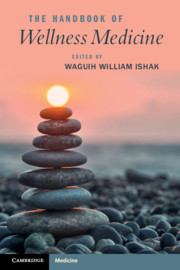Book contents
- The Handbook of Wellness Medicine
- The Handbook of Wellness Medicine
- Copyright page
- Dedication
- Contents
- Contributors
- Part I Approach to Wellness
- Chapter 1 Defining Wellness
- Chapter 2 Screening and Assessment Methods for Wellness
- Chapter 3 The Biopsychosocial Assessment
- Chapter 4 Wellness Measurement
- Chapter 5 The Wellness Treatment Plan
- Part II From Illness to Wellness by Organ Systems/Disorders
- Part III Special Populations and Special Topics
- Part IV Wellness Interventions
- Part V Wellness through Optimization of Work, Love, and Play
- Book part
- Index
- References
Chapter 4 - Wellness Measurement
from Part I - Approach to Wellness
Published online by Cambridge University Press: 18 September 2020
- The Handbook of Wellness Medicine
- The Handbook of Wellness Medicine
- Copyright page
- Dedication
- Contents
- Contributors
- Part I Approach to Wellness
- Chapter 1 Defining Wellness
- Chapter 2 Screening and Assessment Methods for Wellness
- Chapter 3 The Biopsychosocial Assessment
- Chapter 4 Wellness Measurement
- Chapter 5 The Wellness Treatment Plan
- Part II From Illness to Wellness by Organ Systems/Disorders
- Part III Special Populations and Special Topics
- Part IV Wellness Interventions
- Part V Wellness through Optimization of Work, Love, and Play
- Book part
- Index
- References
Summary
Incorporating wellness into considerations of health, healthcare, and social policy has reached an exciting point. Aristotle, Buddha, and other philosophers, sages, and religious leaders throughout history developed great insights into the topic, but only in recent decades has the construct of wellness been examined and clarified through systematic empirical research. There are still major debates regarding several aspects of the topic, but it is now widely considered a measurable construct that should play a role in healthcare and social policy. This volume represents another step forward in bringing wellness into the mainstream of health and healthcare.
Wellness often means different things to different people, and the causes of wellness and the components that comprise well-being continue to be vigorously debated. Philosophical and theological arguments dominated the debate for centuries, with little resolution on important aspects of the subject, and up until recently it was widely believed that too little was known to include considerations of wellness in healthcare practice or policy.
- Type
- Chapter
- Information
- The Handbook of Wellness Medicine , pp. 37 - 44Publisher: Cambridge University PressPrint publication year: 2020

